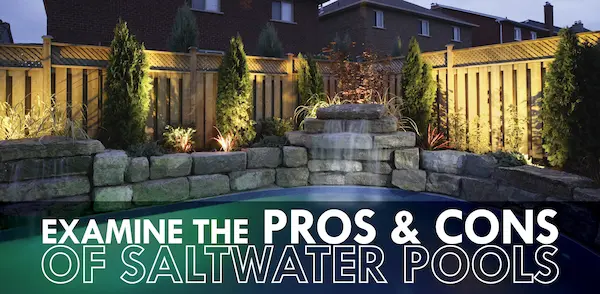Examine the Pros and Cons of Saltwater Pools

As any pool owner will tell you, chlorine is hazardous to store and handle. If it weren’t for backyard swimming pools, there would be no reason to keep this dangerous chemical anywhere near your house.
Perhaps this is one reason you’re considering a saltwater pool. Once reserved for luxury hotels, these systems are now available for backyard pool owners to enjoy right on their property. Learn the pros and cons of saltwater pools to decide if this type of system is right for you.
Pros of Saltwater Pools
- Safer: Saltwater pools aren’t actually chlorine-free. Instead, they create their own chlorine through a process called electrolysis. All you need to do is add sodium chloride (NaCl) to the pool. As the water passes through the chlorine generator cell, an electrical discharge converts the salt into chlorine (HOCl). In this way, you don’t have to store the raw, dangerous chemical on your property, but the water remains disinfected and safe to swim in nonetheless.
- Gentler: In general, the chlorine levels produced by saltwater pools are lower than ordinary pools. If you’re sensitive to chlorine, this is great news, as you’re less likely to suffer eye and skin irritation from swimming.
- “Softer” feel: The addition of salt makes water feel silkier, like rainwater. Most people prefer this to the “harsher” feel of chlorinated water.
- Lower maintenance: With a system that automatically produces its own chlorine, you get to spend less time adding chemicals to the water and more time enjoying yourself in the pool. You still need to monitor chlorine levels and pH weekly – as well as salt, alkalinity, stabilizer and calcium levels monthly – to make sure everything is functioning properly. You should also inspect the chlorine generator cell every three months and clean it as needed.
- Better smell: Most people don’t like the smell of chlorine, especially when it lingers on your hair and skin after swimming. Saltwater systems have little to no chlorine smell.
Cons of Saltwater Pools
- More expensive: As you might have guessed, pools with the convenient capability of self-producing chlorine come with a higher price tag. It’s possible you could recoup your investment in a few years with the money you save on chlorine, but any potential savings are theoretical. There’s no guarantee you’ll get your money back by investing in a saltwater pool.
- More complicated: If a sanitation problem crops up, the usual answer is to add more chlorine. However, any issues that arise with a modern saltwater pool will likely require the help of an experienced technician.
- Potentially damaging: Salt has a corrosive effect. Reports have come through of saltwater damaging fixtures, liners, handrails, heaters, underwater lights and even masonry work. The odds of this happening decrease with professional installation and proper maintenance.
- pH levels tend to run high: To counter this, you may need to consistently add a pH decreaser to the water, adding more to the operational costs of saltwater pools. If you fail to monitor this, calcium precipitant is likely to adhere to the surface of the pool, resulting in a very rough texture.
With these pros and cons, you can make the best decision for you and your family. Keep in mind that, while saltwater pools have a few drawbacks, understanding and catering to them is all you need to do to enjoy this type of pool system to the fullest.
For all your aquatic management needs – including design, installation and maintenance of saltwater pools – please contact The Grounds Guys. We offer both residential and commercial aquatic management services.
 Click to call
Click to call


